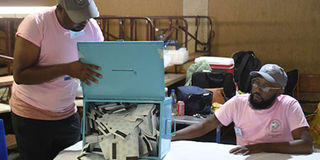Botswana awaits results in cliffhanger election

Polling officers verify ballots from ballot boxes arriving at a counting centre in the Ledumang Senior Secondary school for the Gaborone North constituency, in Gaborone on October 23, 2019. PHOTO | MONIRUL BHUIYAN | AFP
What you need to know:
- According to the IEC, the winner is declared once a party attains 29 parliamentary seats -- the minimum requirement to form a government.
- More than 900,000 of the country's 2.2 million people are registered to vote in the elections, which are at parliamentary and local level.
- This time, the BDP vote share could be around 44 percent of the vote, according to a pre-poll survey carried out by Afrobarometer.
- Should Khama fulfil his goal, it would be the first time diamond-rich Botswana has seen a change of government in 53 years.
GABORONE,
Botswana voted Wednesday in a cliffhanger election set to test the decades-long dominance of the ruling party and challenge the country's image of stability.
The southern African nation's 2,200 polling stations started closing at 7pm (1700 GMT) as many were still waiting in queues to cast their ballots in the evening.
Independent Electoral Commission (IEC) spokesman Osupile Maroba said this would delay counting slightly.
Results are expected as early as Thursday evening. According to the IEC, the winner is declared once a party attains 29 parliamentary seats -- the minimum requirement to form a government.
The Botswana Democratic Party (BDP), which has ruled since independence from Britain in 1966, suffered a seismic jolt in May when former president Ian Khama renounced his hand-picked successor, Mokgweetsi Masisi.
Khama stormed out after accusing his former deputy of autocracy and threw his weight behind the Umbrella for Democratic Change (UDC), once his fiercest critic.
TOUGH ELECTION
"It's the toughest election we have had to fight," Masisi told reporters after voting in his native village of Moshupa, 65 kilometres east of the capital Gaborone.
"But you know I enjoy a test, I enjoy the challenge," he added.
Masisi maintained that the BDP's victory was "automatic", but said he would concede and "retreat" into opposition if his party did "not make it".
Botswana's founding party saw its share of the vote dip below 50 percent for the first time at the last election in 2014.
That year, the two main opposition parties, which teamed up to form the UDC, won a breakthrough 30 percent of the vote.
This time, the BDP vote share could be around 44 percent of the vote, according to a pre-poll survey carried out by Afrobarometer.
VOTER TURNOUT
More than 900,000 of the country's 2.2 million people are registered to vote in the elections, which are at parliamentary and local level.
Maroba said voter turnout had reached more than 50 percent.
The BDP, UDC and two smaller parties are vying for the 57 places in parliament, where the party with the most seats chooses the president.
"These elections are too close to call because no single party is sure of the outcome, unlike before," said Tuelo Gaadingwe, 44, a civil servant queueing to cast his ballot near Moshupa.
"Before this split, (the BDP) were assured of 19 seats in parliament before we even started counting votes."
Should Khama fulfil his goal, it would be the first time diamond-rich Botswana has seen a change of government in 53 years.





